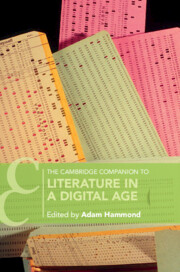Book contents
- The Cambridge Companion to Literature in a Digital Age
- The Cambridge Companion to Literature in a Digital Age
- Copyright page
- Contents
- Figures
- Contributors
- Chronology
- Introduction
- Chapter 1 Literary Data
- Chapter 2 Literary Change
- Chapter 3 The Canon
- Chapter 4 Voice and Performance
- Chapter 5 The Archive
- Chapter 6 Editions
- Chapter 7 Materiality
- Chapter 8 The Literary Marketplace
- Chapter 9 Fanfiction, Digital Platforms, and Social Reading
- Chapter 10 Narrative and Interactivity
- Chapter 11 Generated Literature
- Chapter 12 Literary Gaming
- Chapter 13 The Printed Book in the Digital Age
- Chapter 14 Literature’s Audioptic Platform
- Chapter 15 Critique
- Index
- Cambridge Companions To Literature
Chapter 7 - Materiality
Published online by Cambridge University Press: 29 November 2024
- The Cambridge Companion to Literature in a Digital Age
- The Cambridge Companion to Literature in a Digital Age
- Copyright page
- Contents
- Figures
- Contributors
- Chronology
- Introduction
- Chapter 1 Literary Data
- Chapter 2 Literary Change
- Chapter 3 The Canon
- Chapter 4 Voice and Performance
- Chapter 5 The Archive
- Chapter 6 Editions
- Chapter 7 Materiality
- Chapter 8 The Literary Marketplace
- Chapter 9 Fanfiction, Digital Platforms, and Social Reading
- Chapter 10 Narrative and Interactivity
- Chapter 11 Generated Literature
- Chapter 12 Literary Gaming
- Chapter 13 The Printed Book in the Digital Age
- Chapter 14 Literature’s Audioptic Platform
- Chapter 15 Critique
- Index
- Cambridge Companions To Literature
Summary
What is a book, really? In tracing the passage of a single work from the alleys of Lahore to online retail and the author’s bookshelf, this chapter argues against idealism. In transmission, ideational content sediments within specific material contexts. In this way, ideas become objects. Consequently, the same idea can take shape by drastically different forms, affecting the practice of interpretation. The affordances of the object – what can be done with it, how, and where – affect our practices of interpretation.
- Type
- Chapter
- Information
- The Cambridge Companion to Literature in a Digital Age , pp. 125 - 136Publisher: Cambridge University PressPrint publication year: 2024

